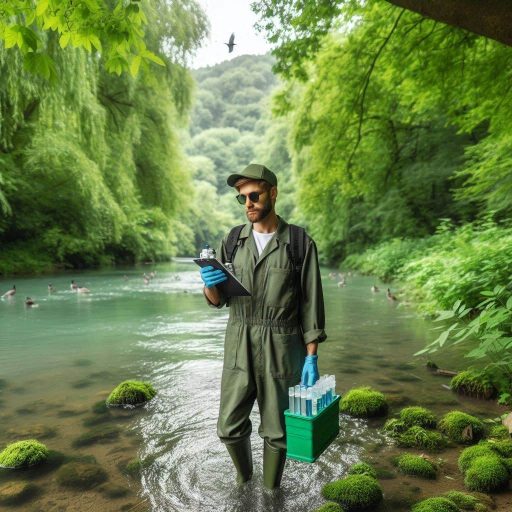Introduction
Volunteer Opportunities for Aspiring Environmental Technicians
Aspiring environmental technicians can greatly benefit from volunteering in organizations focused on environmental conservation and sustainability.
Hands-on experience in the field allows them to apply classroom knowledge to real-world scenarios.
Volunteering builds essential skills, such as data collection, field analysis, and equipment handling.
Key Reasons to Volunteer
- Gain Practical Experience: Volunteering helps aspiring technicians learn valuable field skills and environmental practices firsthand.
- Expand Professional Networks: Engaging with experienced professionals offers networking opportunities that can lead to future job placements.
- Enhance Personal Development: Volunteering fosters teamwork, communication, and problem-solving skills crucial for a successful career.
Benefits of Volunteering
- Skill Building: Develop technical skills in soil analysis, water quality testing, and air monitoring.
- Resume Enhancement: Experience gained through volunteering stands out to future employers.
- Community Impact: Contribute to local environmental initiatives, fostering a positive impact on the community.
By volunteering, aspiring environmental technicians gain the experience, skills, and connections needed to advance in their careers and make a difference in their communities.
Researching Volunteer Opportunities
Finding volunteer opportunities as an aspiring environmental technician requires effective research strategies.
Here are some steps to guide your search:
Use Online Resources
- Visit websites like VolunteerMatch, Idealist, and GreenVolunteers.
- Explore environmental job boards such as Conservation Job Board and EnvironmentJob.
- Check platforms like LinkedIn for volunteer postings in environmental sectors.
Leverage Popular Platforms
- Search on local community boards like Nextdoor or Craigslist.
- Use social media groups and pages dedicated to environmental causes.
- Browse government websites for volunteer programs in conservation and sustainability.
Reach Out to Local Organizations
- Contact local environmental nonprofits, such as The Sierra Club or Audubon Society.
- Visit local offices of national organizations like The Nature Conservancy.
- Attend community events and environmental fairs to network directly.
Contact Environmental Agencies
- Reach out to city or state environmental departments.
- Inquire about volunteer programs with park services or wildlife management agencies.
- Check their websites for internship and volunteer listings.
Sign Up for Newsletters
- Subscribe to newsletters from environmental organizations.
- Follow organizations on social media for updates on volunteer opportunities.
- Join mailing lists for specific environmental projects.
By actively using these resources, you can discover various volunteer opportunities that align with your passion and goals as an environmental technician.
Read: CAD Technician vs. Draftsman: Key Differences
Types of Volunteer Roles Available
Volunteering offers invaluable experience for aspiring environmental technicians.
Various roles provide hands-on skills and knowledge crucial for building a successful career.
Here‘s a look at different volunteer opportunities and the skills they impart.
Field Work
Field work involves working directly in natural environments.
Volunteers might participate in habitat restoration or species monitoring.
This role offers practical experience with environmental conditions and challenges.
Volunteers develop skills in outdoor survival, data recording, and hands-on problem-solving.
Field work teaches resilience and adaptability in dynamic settings.
Research Assistant
As a research assistant, volunteers support scientific studies and environmental assessments.
Tasks often include preparing materials, conducting experiments, and analyzing results.
This role provides insight into scientific methodologies and research design.
Volunteers gain skills in experimental techniques, data analysis, and scientific communication.
They also learn to manage and interpret research data effectively.
Data Collection
Data collection roles involve gathering and organizing environmental information.
Volunteers might collect samples, record observations, or manage databases.
This role is crucial for generating accurate environmental data.
Volunteers develop skills in data management, attention to detail, and statistical analysis.
They also learn how to ensure data integrity and reliability.
Community Outreach
Community outreach roles focus on educating the public and promoting environmental awareness.
Volunteers might organize events, create educational materials, or lead workshops.
This role enhances communication and public speaking skills.
Volunteers learn to engage diverse audiences and advocate for environmental issues.
They gain experience in event planning, educational content creation, and community engagement.
Skills and Experience Gained
Each volunteer role builds a unique skill set.
Field work improves practical, hands-on environmental skills.
Research assistant positions enhance scientific knowledge and research proficiency.
Data collection roles develop analytical and data management capabilities.
Community outreach roles strengthen communication and public engagement skills.
Engaging in these roles provides a well-rounded foundation for aspiring environmental technicians.
Volunteers gain practical experience, develop specialized skills, and contribute to meaningful environmental work.
This hands-on experience not only bolsters a resume but also deepens understanding and passion for environmental stewardship.
Benefits of Volunteering
Volunteering offers aspiring environmental technicians a wealth of benefits.
It plays a crucial role in professional development.
Engaging in volunteer work allows individuals to build a robust professional network within the environmental sector.
Building a Professional Network
Volunteering connects individuals with professionals who share similar interests.
It opens doors to valuable industry contacts.
Networking opportunities often lead to job referrals and mentorship.
Collaborating on projects with experienced technicians can offer insights into the field.
Building these relationships early can significantly enhance career prospects.
Networking through volunteer activities often leads to invitations to industry events.
Such exposure can help in gaining visibility and credibility in the field.
Gaining Hands-On Experience
Volunteering provides practical, hands-on experience that is essential for skill development.
Working on real projects allows individuals to apply theoretical knowledge.
Practical experience gained through volunteering can be a significant asset in job applications.
Volunteering often involves tasks such as data collection, environmental monitoring, and fieldwork.
These tasks are directly relevant to the work of environmental technicians.
This hands-on involvement helps in understanding industry practices and standards.
It also fosters problem-solving skills by presenting real-world challenges.
Developing Industry-Specific Skills
Volunteer roles frequently offer opportunities to develop technical skills.
Operating environmental monitoring equipment and analyzing data are common tasks.
Learning these skills in a real-world context is invaluable.
Volunteering also helps in improving project management skills.
Managing time and resources efficiently is crucial in environmental projects.
Developing these skills enhances overall professional competence.
Additionally, volunteering often involves collaboration with various stakeholders.
This experience can improve communication and teamwork skills.
Enhancing Resume and Job Prospects
Experience gained through volunteering can significantly enhance a resume.
It demonstrates commitment and practical knowledge to potential employers.
Highlighting volunteer work shows initiative and a proactive attitude.
Employers value candidates who have practical, hands-on experience.
Volunteering can set an individual apart from other candidates.
It reflects a genuine interest in the field and a willingness to contribute.
Volunteering offers numerous benefits for aspiring environmental technicians.
It helps build a valuable professional network, provides hands-on experience, and develops essential skills.
These advantages make volunteering an excellent stepping stone for a successful career in environmental technology.
Transform Your Career Today
Unlock a personalized career strategy that drives real results. Get tailored advice and a roadmap designed just for you.
Start NowRead: CAD Technician Certification: What You Need to Know
How to Make the Most of Volunteering
Volunteering is a powerful way for aspiring environmental technicians to gain practical experience and build essential skills.
To make the most of this opportunity, consider the following tips.
Embrace Responsibilities
Taking on responsibilities is crucial.
It demonstrates your commitment and eagerness to learn. Volunteer for tasks that challenge you and push your limits.
Don‘t shy away from projects outside your comfort zone. These experiences will help you grow and build a robust skill set.
Seek Out Mentorship
Finding a mentor can provide invaluable guidance.
Look for experienced professionals who can offer advice and share their knowledge.
A mentor can help you navigate the complexities of the field and provide insights that you won‘t find in textbooks.
Approach potential mentors with genuine interest and a willingness to learn.
Ask Questions
Never hesitate to ask questions.
Curiosity drives learning and improvement.
If you don‘t understand something, seek clarification immediately.
Asking questions shows your enthusiasm and dedication.
It also helps you grasp complex concepts more effectively.
Use every opportunity to deepen your understanding.
Network with Professionals
Networking is a key aspect of career development.
Engage with professionals in the field through events, workshops, and online forums.
Building relationships with others in your field can open doors to new opportunities.
It also allows you to stay informed about industry trends and best practices.
Seek Feedback on Your Work
Regular feedback is essential for growth.
Ask your supervisors and peers for constructive criticism.
Understand areas where you excel and where you need improvement.
Use this feedback to refine your skills and enhance your performance.
Actively seeking feedback shows a commitment to personal and professional development.
Reflect on Your Experiences
Take time to reflect on your volunteer experiences.
Assess what you‘ve learned and how you‘ve applied your skills.
Reflecting helps you understand your strengths and areas for improvement.
It also allows you to appreciate the progress you‘ve made and set future goals.
Be Proactive
Proactivity is key in making the most of your volunteer experience.
Don‘t wait for opportunities to come to you. Look for ways to contribute and make a difference.
Take the initiative in your tasks and seek out additional projects that interest you.
Stay Positive and Enthusiastic
Maintaining a positive attitude will make your volunteer experience more enjoyable and productive.
Enthusiasm is contagious and can motivate others around you.
Approach each task with energy and a willingness to learn.
Your positive outlook will leave a lasting impression on those you work with.
By embracing responsibilities, seeking mentorship, asking questions, networking, and actively seeking feedback, you can maximize your volunteer experience.
These strategies will help you build a solid foundation for your career as an environmental technician.
Read: Online Courses for Surveying and Mapping Technicians

Gaining Practical Skills
Volunteering offers aspiring environmental technicians a wealth of practical skills.
These skills are crucial for future career success.
Data Collection
Volunteers often participate in data collection efforts.
They learn to gather and record data accurately.
This includes sampling air, water, and soil.
Mastering these techniques improves precision in data handling.
Proficiency in data collection strengthens their analytical abilities.
Accurate data is essential for environmental assessments and reports.
Fieldwork Techniques
Fieldwork is a fundamental aspect of environmental science.
Volunteering provides hands-on experience in various fieldwork techniques.
Technicians learn to use scientific instruments and tools.
They gain skills in site assessment and environmental monitoring.
These experiences build confidence in conducting field studies.
Competence in fieldwork directly translates to better performance in professional roles.
Research Methods
Volunteers often assist with research projects.
They learn how to design and implement research methods.
This includes developing hypotheses and conducting experiments.
Volunteers gain experience in analyzing results and interpreting data.
These skills are critical for understanding environmental issues.
Experience in research enhances their ability to contribute to scientific studies.
Project Management
Volunteering also involves project management tasks.
Aspiring technicians learn to plan, organize, and execute projects.
They become adept at managing timelines and resources.
Volunteers coordinate with teams and stakeholders.
These management skills are valuable for leading environmental projects.
Effective project management is crucial for career advancement in the field.
Enhancing Future Career Prospects
Acquiring these skills through volunteering sets technicians apart in the job market.
Proficiency in data collection and fieldwork techniques demonstrates technical competence.
Experience with research methods showcases analytical and problem-solving abilities.
Strong project management skills highlight leadership and organizational capabilities.
These competencies make candidates more attractive to employers.
Volunteering also helps technicians build a professional network.
They connect with experienced professionals and organizations.
These connections can lead to job opportunities and career growth.
Volunteers often receive recommendations and references from their work.
These endorsements can enhance their credibility and job prospects.
Volunteering equips aspiring environmental technicians with essential skills.
Data collection, fieldwork techniques, research methods, and project management are critical competencies.
Gaining these skills through volunteering enhances career prospects.
Technicians who volunteer are well-prepared for professional roles and future challenges in environmental science.
Read: Surveying and Mapping Technician: Job Satisfaction
Networking Opportunities
Volunteering offers a direct path to networking for aspiring environmental technicians.
It provides unique opportunities to connect with professionals in the field.
Transform Your Career Today
Unlock a personalized career strategy that drives real results. Get tailored advice and a roadmap designed just for you.
Start NowBuilding relationships through volunteering can lead to job or internship opportunities.
How Volunteering Enhances Your Network
- Access to Industry Professionals: Volunteering puts you in direct contact with experienced environmental technicians and industry experts. These connections can be invaluable.
- Opportunities for Mentorship: By working alongside professionals, you can gain mentors who offer guidance and career advice.
- Visibility in the Field: Regular involvement in volunteer activities raises your profile within the environmental sector. This visibility can open doors to new opportunities.
- Collaboration with Peers: Volunteering allows you to meet other aspiring technicians.
These peer relationships can lead to collaborations on projects or referrals for job openings.
Leveraging Volunteer Work for Job Opportunities
- Demonstrating Commitment: Volunteering showcases your dedication to environmental causes.
Employers value this commitment and may see you as a strong candidate. - Building a Solid Reputation: Consistent volunteering helps build a positive reputation within the industry.
Your reliability and work ethic will be noticed by professionals. - Creating Opportunities: Engaging in volunteer work can lead to internships or job offers. Employers often prefer candidates they‘ve seen in action.
Expanding Your Network Through Events
- Attend Industry Events: Many organizations host workshops, conferences, and seminars. Volunteering at these events gives you access to key industry players.
- Participate in Workshops: Workshops offer hands-on experience and networking opportunities. They‘re a great way to learn and connect simultaneously.
- Join Conferences: Conferences bring together a broad range of professionals. Volunteering at these events can provide a comprehensive view of the industry and numerous networking possibilities.
Volunteering is more than just giving back; it’s a strategic move to build your career.
By actively engaging, you can expand your network, open doors to new opportunities, and lay a solid foundation for your future as an environmental technician.
Impact of Volunteering on Career Prospects
Volunteering offers significant advantages for aspiring environmental technicians.
It can profoundly influence career prospects and open doors to new opportunities.
This section explores how volunteering enhances resumes and highlights passion and commitment.
Enhancing Your Resume
Volunteering provides hands-on experience that enriches your resume.
It allows you to gain practical skills and knowledge relevant to environmental technology.
Employers often seek candidates with real-world experience, making your resume stand out.
Demonstrating involvement in environmental projects shows that you are proactive and engaged.
Moreover, volunteering exposes you to various aspects of environmental work.
You might manage waste reduction programs, conduct field research, or participate in conservation efforts.
Each experience adds depth to your resume and shows a comprehensive understanding of the field.
Making Yourself More Attractive to Employers
Employers value candidates who have demonstrated commitment through volunteering.
When you volunteer, you show that you are dedicated to the field of environmental technology.
This commitment can differentiate you from other candidates who may only have academic qualifications.
Volunteering can also expand your professional network.
Building connections with professionals and organizations in the environmental sector can lead to job referrals and insider knowledge about job openings.
Networking through volunteer work often results in valuable recommendations and endorsements.
Demonstrating Passion and Commitment
Volunteering is a clear indicator of your passion for environmental issues.
By dedicating your time and effort, you prove that you are genuinely interested in making a difference.
This enthusiasm is something employers look for, as it suggests that you will be a motivated and driven employee.
Additionally, your volunteer work reflects your commitment to ongoing learning and improvement.
It shows that you are willing to go beyond formal education to gain practical experience.
Such dedication is highly regarded in the environmental technology field.
Volunteering significantly impacts career prospects for aspiring environmental technicians.
It enhances resumes by providing practical experience and demonstrates a strong commitment to the field.
By volunteering, you not only gain valuable skills but also show potential employers that you are passionate and dedicated.
This proactive approach can set you apart and help you build a successful career in environmental technology.
Gain More Insights: How Transportation Engineers Address Traffic Congestion
Conclusion
Volunteering offers aspiring environmental technicians a chance to gain hands-on experience.
It provides practical exposure to environmental challenges and solutions.
By engaging in various projects, volunteers learn essential skills and industry practices.
They also gain insights into the daily responsibilities of environmental technicians.
Taking advantage of volunteer opportunities significantly boosts career prospects.
It helps build a robust resume that stands out to potential employers.
Volunteers often receive recommendations and networking opportunities that open doors in the industry.
Gaining experience through volunteering also allows for a clearer understanding of career paths and specializations.
Volunteering helps establish valuable professional connections.
It enables aspiring technicians to meet industry professionals and mentors.
These connections can lead to internships, job offers, and collaborative projects.
Networking through volunteer work can provide guidance and support throughout one’s career journey.
Volunteers demonstrate a commitment to environmental causes, which is crucial in the field.
Their involvement showcases dedication and passion, traits valued by employers.
This commitment helps build a solid foundation for a career in environmental technology.




